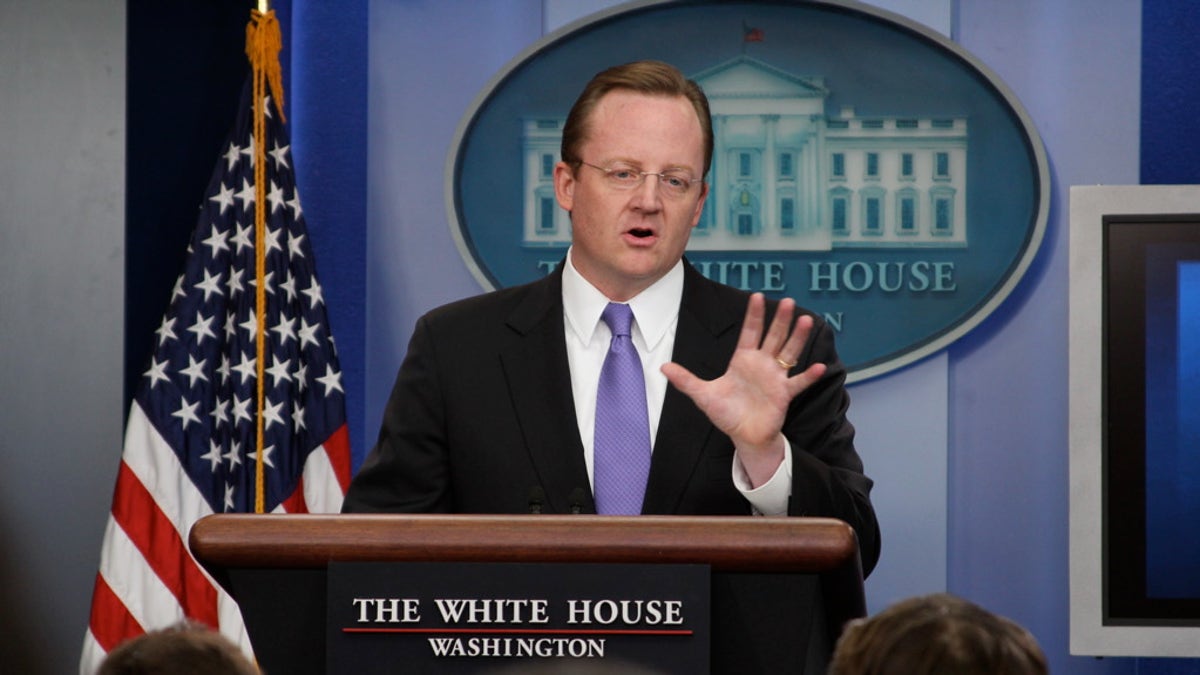
Robert Gibbs at the press briefing October 4, 2010 (Fox News Photo)
Even though the president's aides believe Democrats will retain control of the House and Senate, they're prepared for a scaled down legislative agenda after next month's elections. But officials say it's not because Republicans will be calling more of the shots.
Part of the reason is that the largest items on Mr. Obama's agenda, including the Recovery Act, health care reform and financial regulatory reform, have already been passed by Congress. Another part of the reason is that few here expect Republicans to follow their likely gains in the House and Senate, with a change in their strategy of opposing the Democrats' initiatives.
Asked at a briefing about unfinished legislative business, White House Press Secretary Robert Gibbs ticked off a number of items for a potential lame duck session: extending the Bush administration tax cuts, ratifying the START treaty with Russia, reauthorizing the Children's Nutrition program and confirming Austan Goolsbee as the president's new budget director as well as confirming a number of federal judicial nominees.
While the debate over extending the tax cuts is likely to be resolved in the lame duck session, either by temporarily extending all the cuts or permanently extending just those for the middle class, some of the other issues are likely to spill over into the next legislative session. And they are "small ball" compared with what Democrats managed to pass this year, largely over the objections of Republicans.
Gibbs said White House officials haven't spent a lot of time "worrying about or thinking about legislative tactics and strategy for -- for next January." And while he cites "a whole host of things -- certainly energy, immigration and many others" that he says present opportunities to work with across party lines, he also says "you can't get (Republicans) to cooperate on anything if their answer to everything is no." In light of the Republican Pledge to America's call for repealing the health care reform law, Gibbs says a good deal of effort, next year, will be implementing that law and the financial regulatory law.
Republicans are likely to have more control over energy policy. The comprehensive energy-climate change bill that died in the Senate is unlikely to be revived, but Democratic Representative Ed Markey, of Massachusetts, has signaled he's willing to compromise on a set of standards for generating electricity from renewable sources. That would allow Republicans a way to avoid the cap and trade system they declared "cap and tax," and still let Democrats boast of reducing greenhouse gas emissions.
The president's already signaled a willingness to accommodate some Republican demands for border security measures in advance of comprehensive immigration reform, but he's also shown a willingness to use immigration reform as a campaign issue. If Republicans continue to block the path to citizenship Democrats feel is needed to lure 12 million illegals out of the shadows, Democrats are likely to continue to block the guest worker program opposed by organized labor. That means no comprehensive reform, and Democratic strategists believe Republicans are more likely to pay the price, in lost support among Hispanics, in the 2012 election.




